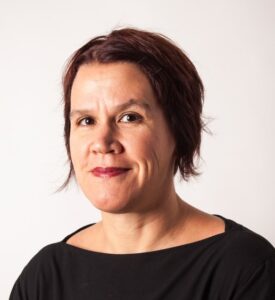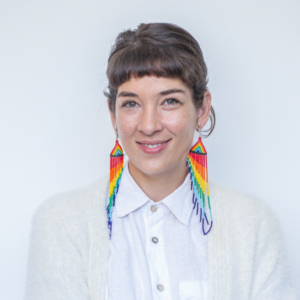
Program
The first two days of the seminar will be open to the public, expecting to draw up to 200 participants to engage in keynote presentations and a panel. The remaining three days will focus on more intensive and collaborative sessions, reserved for invited tutors and selected students. These participants will join local community members in dedicated working groups to address pressing local and global sustainability issues. Through these sessions, they will explore how emerging technologies such as AI and data visualization techniques can solve these challenges. This collaborative environment aims to facilitate the exchange of groundbreaking ideas, foster research partnerships, and inspire the development of new projects.
Keynotes
Tech's Diversity, Sustainability and Inclusion Gap
Frédérique Krupa
In a rapidly evolving digital age, the intersections of technology, sustainability, and social equity are becoming increasingly significant. This keynote address will delve into the critical issues facing the tech industry today, focusing on the disparities that persist in diversity, sustainability practices, and inclusion efforts. We will explore the current state of diversity within the tech sector, highlighting the challenges and opportunities for creating a more inclusive workforce. The talk will also address the environmental impacts of tech advancements, generative AI in particular, and the urgent need for sustainable practices in an industry known for its rapid consumption of resources. Through compelling data visualizations and real-world examples, this keynote will provide a comprehensive understanding of how integrating diversity, sustainability, and inclusion can drive not only ethical advancements but also lead to more robust and resilient technological innovations.

Dr. Frédérique Krupa is director of the Digital Design Lab at l’école de design Nantes Atlantique and a UX designer and research methodology specialist. In parallel to her design career at Virtools, Dassault Systemes and Simple Is Beautiful, she has been a professor at prestigious design schools such as Parsons School of Design, RISD, University of the Arts, ENSAD and Paris College of Art, where she founded and chaired the Masters (MA) and Masters of Fine Arts (MFA) in Transdisciplinary New Media. She completed her Doctorate in Design at the Université Paris 1 Panthéon-Sorbonne with her dissertation Girl games: gender, design and technology in the service of women’s recruitment in ICT?, followed by a postdoc action research in peer-to-peer ICT pedagogy at the faculty-free and highly competitive computer science school 42, specializing in machine learning algorithms and AI ethics. Her current research focuses on establishing ML UX design methods, a holistic, transdisciplinary and systemic approach to create fair, accountable and transparent machine learning data, algorithms and predictive models
Improving IPCC Data Visualization with Traceability
Jean-Daniel Fekete
Climate change is a critical issue nowadays that requires clear and convincing communication to be understood by the largest possible population and lead to actions.
The Intergovernmental Panel on Climate Change (IPCC) is an international body endorsed by the UN in charge of reports on climate change. Unfortunately, their published figures, designed by climate scientists, are extremely difficult to understand outside by non specialists. Yet, their data and figures are endorsed by most UN countries and cannot be dismissed easily by critics and deniers. Some designers have successfully improved some of the IPCC figures, but they do not benefit from the credentials IPCC has and can be easily dismissed as activists. I will explain our work towards improving IPCC figures with traceability to keep the credentials while widening the target audience of the figures.

Dr. Jean-Daniel Fekete is a Senior Research Scientist at Inria and the Scientific Leader of the Inria Project-team Aviz, which he founded in 2007 and integrated into Université Paris-Saclay in 2020. With a PhD in Computer Science from Université Paris-Sud (now Université Paris-Saclay), Fekete’s research focuses on Visual Analytics, Information Visualization, and Human-Computer Interaction. He has published over 180 articles in prestigious conferences and journals, and has received the IEEE VGTC Visualization Career Award in 2020. Fekete is a member of the IEEE VGTC Visualization Academy and ACM SIGCHI Academy, and has held significant roles such as Associate Editor in Chief of IEEE Transactions on Visualization and Computer Graphics, General Chair of the IEEE VIS Conference in 2014, and President of the French-Speaking HCI Association (AFIHM). For more information, visit https://aviz.fr/~fekete/.
The power of advocacy
Bruna Albuquerque
In this engaging presentation, we will explore the transformative impact of advocacy in shaping policies, driving social change, and influencing public opinion. The talk will delve into various forms of advocacy, from grassroots movements to institutional lobbying, and examine how effective advocacy strategies can bring about meaningful progress in diverse fields. Join us for a thought-provoking discussion on how harnessing the power of advocacy can catalyze change and promote justice across different spheres of society.

Bruna Albuquerque, Specialist Lawyer in Environmental Law from the Federal University of Rio Grande do Sul – UFRGS and Master’s student in Environmental Management from IFPE. Environmental expert, ISO 14001 internal auditor, sustainability consultant, triple positive impact and ESG. Researcher and activist for environmental and common rights. Enthusiastic about Permaculture and Nature-Based Solutions.
Circular Economy: A Blueprint for Climate Resilience
Mariana Amazonas
In a world facing growing environmental challenges, how can industries turn waste into opportunity? This presentation explores the circular economy as a crucial framework for building climate resilience. We’ll dive into the urgent need to move beyond outdated linear models and embrace circular practices that prioritize sustainability and resource efficiency. We’ll examine innovative examples of waste repurposing and sustainable strategies, exploring how these approaches can be applied across various industries. How can intelligent resource management and nature-based solutions become the standard? And what role can we all play in driving these critical changes? Join this conversation to uncover how the circular economy is not just a concept, but a practical path forward for reducing environmental impact and ensuring long-term resilience in the face of the global climate crisis.

Mariana Amazonas is a specialist in Ecological Design Thinking with a Master’s degree from Schumacher College, UK, and an MBA in Innovation and Entrepreneurship. She brings a diverse academic background to her work, having studied holistic approaches to sustainability and complex systems. As the co-founder of RODA, Mariana has driven innovative projects that focus on circular economy principles, particularly in repurposing industrial waste. With over 15 years of experience in strategic planning and marketing for major multinational companies, she combines her business experience with socio-environmental purpose to create solutions that address critical environmental challenges. Mariana’s work emphasizes the integration of circular economy strategies and Nature-Based Solutions, fostering resilience and sustainability across various industries.
Lightning talks

Dr. Raimundo Macedo is a full professor at UFBA with a background in Computer Science and Mechatronics. He coordinates the Distributed Systems Laboratory (LaSiD) and leads the Task Force on Climate Change and Digital Technologies at IFIP. He has served as President of the Brazilian Computer Society (SBC) and held leadership roles in various national and international organizations. With degrees from UFBA, UNICAMP, and the University of Newcastle Upon Tyne, he pioneered graduate programs in Computer Science and Mechatronics at UFBA. He has coordinated numerous research projects and supervised theses in distributed systems, fault tolerance, and real-time systems. His contributions include establishing critical digital infrastructure at UFSB and participating in significant international collaborations and conferences in his field.

Dr. Lesandro Ponciano is a researcher and professor. He holds a PhD and a master’s degree in Computer Science and a bachelor’s degree in Information Systems. His work is mainly quantitative empirical research, including characterization, simulation, modeling and evaluation of systems based on metrics and estimates associated with human factors such as trust, privacy and explainability. His scientific contributions are parallel and distributed computing infrastructure for e-science, citizen science and participatory science. He has teaching and research experience in the areas of Human-Computer Interaction, Software Engineering and Information Systems.
PANEL - Technology and the Planet: Navigating the Balance Between Innovation and Sustainability
In an era where technology is both a driver of progress and a potential threat to our environment, this panel will explore the dual-edged nature of technological innovation. Experts from various fields will discuss how technology can be harnessed to mitigate climate change while addressing the unintended consequences that may arise. Key topics will include the role of emerging technologies in shaping our planet’s future, strategies for integrating sustainability into tech development, and ethical considerations in technological advancements.
Workshops
Designing Data Narratives with Environmental Data
Georgia Panagiotidou
This workshop invites students, journalists, activists and the general public to a learn how to effectively and creatively communicate environmental data stories. Given the emergency of climate change, there is a need to better engage readers with scientific environmental data and help that data become more actionable. In this workshop, we will start from local datasets from Pernambuco state (participants are welcome to bring their own data as well) and work in teams to create stories in the form of visualizations, data comics, physicalizations or even data videos. This will be a guided hands-on session including sketching, data wrangling, storyboarding and coding.

Dr. Georgia Panagiotidou is an Assistant Professor in the Department of Informatics at King’s College London specialising on how people handle issues such as biases, uncertainties and frictions when using data representations such as visualizations. She has an established track record within HCI on the topics of sustainable HCI and energy communication especially as they relate to collective action. Before returning to academia, Georgia worked in the field of data design and journalism, as part of the data team of the largest daily newspaper in Finland (Helsingin Sanomat) as well as part of multiple NGOs including the Open Knowledge Foundation Finland where her visualizations had extensive audience and impact.
Making data tangible: zero-waste physicalizations
Sarah Hayes
This workshop focuses on developing a Zero-Waste Data Physicalization Kit, aimed at reducing the environmental impact of data physicalization workshops. Traditional workshops often use materials that generate waste, despite the temporary nature of the artefacts created. This session introduces a sustainable alternative, featuring a kit made from reusable, repurposed, and biodegradable materials. Participants will explore the motivation behind the toolkit, learn about the criteria for selecting eco-friendly materials, and discuss the toolkit’s design process. The workshop will also outline future research plans to evaluate the kit’s effectiveness in teaching data physicalization to beginners.

Dr. Sarah Hayes is an Assistant Lecturer at Munster Technological University, specializing in Media Communications. She earned her PhD in the same field, focusing her research on how sustainable and inclusive data physicalizations can enhance the way people interact with and experience data. With a strong background in UX and UCD research in collaboration with industry, Sarah is deeply involved in exploring the intersection of human-computer interaction (HCI) and information visualization (InfoVis).